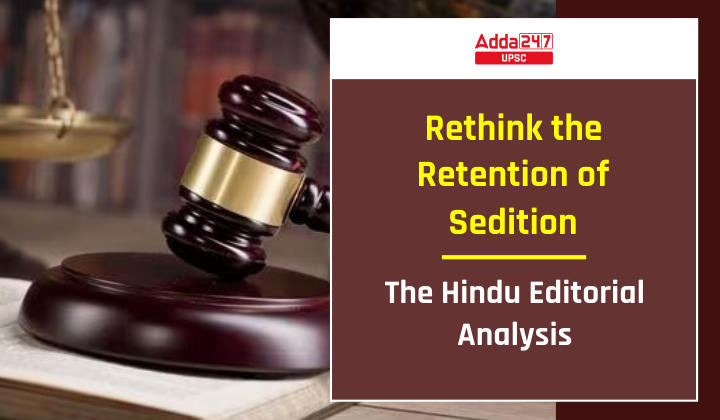Table of Contents
The Hindu Editorial Analysis: The Editorial Analysis of The Hindu Newspaper Editorial Articles aimed at simplifying various concepts relevant to the UPSC and other State PSC Exams. The Editorial Analysis helps in expanding the knowledge base as well as framing better quality mains answers. Today’s Hindu Editorial Analysis of ‘Rethink the Retention of Sedition’ discusses recent report of Law Commission of India on Section 124A of the Indian Penal Code (IPC) on ‘sedition’.
Section 124A of IPC in News
In its 279th report released in April 2023, the Law Commission of India recommended retaining Section 124A of the Indian Penal Code (IPC) on ‘sedition’, one of the most contentious sections in recent times. The Supreme Court of India had earlier directed all state governments and the central government to suspend all pending trials, appeals, and proceedings related to Section 124A IPC, citing its inconsistency with the current social milieu.
Law Commission Justification for Retaining Sedition in IPC
The Law Commission concluded that retaining the section was necessary to counter the threat to India’s internal security like from Maoist violence. It also noted that the Unlawful Activities (Prevention) Act (UAPA) does not cover all elements of the offence defined under Section 124A IPC. To prevent misuse of the section, the Commission recommended certain procedural guidelines.
Countering Law Commission’s Justification
Following data and arguments have been discusses to nullify Law Commission’s Justification for retaining the sedition law in India
Minimal use of Sedition Law against Maoists
The Law Commission’s report delved into the violence perpetrated by Maoists under the chapter on ‘Threats to India’s Internal Security’. The report cited Ministry of Home Affairs data, indicating a decrease in Maoist incidents over the years, with Chhattisgarh still reporting the highest number.
- Interestingly, the number of cases registered under Section 124A IPC in Chhattisgarh remained low, while provisions under the Explosive Substances Act, IPC, and the Chhattisgarh Special Public Safety Act were more frequently applied.
- While the number of Maoist incidents registered in the State varied from 445 in 2014 to 253 in 2021, the National Crime Records Bureau (NCRB) data show that the number of cases registered (only) under Section 124A IPC was zero in the years 2015, 2016, 2017, and 2020, and varied from one, to a maximum of three in the remaining years between 2014 and 2021.
- Even the cases registered under the UAPA were close to three per year in the same period.
- Thus, it is clear that the use of Section 124A IPC in fighting Maoism has been negligible.
Objective Scope of UAPA’s Provisions
Comparatively, the UAPA’s provision on ‘unlawful activity’ appeared more objective and less problematic, with the Supreme Court clarifying that ‘criticizing the government’ does not amount to sedition.
- ‘Unlawful activity’ defined under Section 2(1)(o) of the UAPA includes ‘any action taken by such individual or association which causes or is intended to cause disaffection against India’.
- The punishment prescribed is imprisonment up to seven years and fine.
- The only difference between Section 124A IPC and this provision of the UAPA is that in place of the words ‘Government established by law in India’, the word ‘India’ is used in the UAPA.
- Any hurdle before any such prosecution under the UAPA that requires central government sanction can be removed by tweaking Section 45 of the UAPA to authorise State governments to act as well as grant sanction for prosecution.
Contradicts Existing Jurisprudence on Registration of FIR
It emphasized the need for procedural guidelines for conducting preliminary inquiries to determine the existence of prima facie evidence. However, these guidelines seemed to conflict with established jurisprudence regarding the registration of First Information Reports (FIRs).
- The Supreme Court has ruled that if information discloses a cognizable offence, an FIR must be registered and an investigation initiated.
- Preliminary inquiries are only permissible in cases that do not disclose the basis of a cognizable offence.
- Inserting provisions for mandatory permission from the central or state government before registering an FIR or conducting such inquiries may raise constitutional concerns under Article 14.
Conclusion
Given the significance of the issue, it is important for all state governments and political parties to engage in deliberation and seek public opinion on the Law Commission’s report. A participative and agreeable decision, even if not unanimous, would foster a more democratic approach to addressing the concerns surrounding Section 124A IPC.
A Summit with Substance, The Hindu Editorial Analysis
| Follow US |
| UPSC Govt Jobs UPSC Current Affairs UPSC Judiciary PCS Download Adda 247 App here to get the latest updatesA participative and agreeable decision, even if not unanimous, would foster a more democratic approach to addressing the concerns surrounding Section 124A IPC. |


 TSPSC Group 1 Question Paper 2024, Downl...
TSPSC Group 1 Question Paper 2024, Downl...
 TSPSC Group 1 Answer key 2024 Out, Downl...
TSPSC Group 1 Answer key 2024 Out, Downl...
 Cabinet Ministers of India 2024, New Cab...
Cabinet Ministers of India 2024, New Cab...







